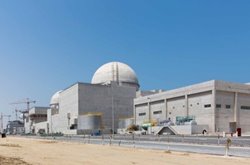 Rising out of the Arabian Desert and around 300 km due west of Abu Dhabi is the four-unit Barakah Nuclear Energy Plant. Construction of Unit 1 of the Barakah plant has recently been completed and operational readiness preparations are now underway. The Barakah plant is being constructed by the Emirates Nuclear Energy Corporation (ENEC) and its joint venture partner and prime contractor, the Korea Electric Power Corporation (KEPCO).
Rising out of the Arabian Desert and around 300 km due west of Abu Dhabi is the four-unit Barakah Nuclear Energy Plant. Construction of Unit 1 of the Barakah plant has recently been completed and operational readiness preparations are now underway. The Barakah plant is being constructed by the Emirates Nuclear Energy Corporation (ENEC) and its joint venture partner and prime contractor, the Korea Electric Power Corporation (KEPCO).
The need for leadership development
ENEC, along with its joint venture subsidiaries Nawah Energy Company, which is responsible for operating the plant, and Barakah One Company, which manages the commercial and financial interests of the project, have a culturally diverse workforce from over 40 countries. Therefore, the development and alignment of those leading various components of the UAE Peaceful Nuclear Energy Programme, and the Barakah plant, to a common set behaviours based on the corporate values is key to success. It is anticipated that almost 500 leaders will receive training by the start of Unit 1 operations. The programme was developed in line with international best practice and has been enhanced over the past two years - in line with a commitment to continuous improvement - through the feedback received from delegates.
Programme description
WANO’s Ian Moss, who was at the time the key advisor on the project, states: “In my experience of designing and running a large number of programmes in several countries, this was one of the most interesting and enjoyable. Firstly the delegates on the pilot programme were from five different countries, some with diametrically differing social outlooks and cultural differences. We learnt so much from them.”
“Secondly the programme employed a very successful strategy called the ‘diagonal slice’, with delegates from different areas of the business and experience levels all being mixed together in the cohort. This means that as much learning comes from within the room as from the front of the room”.
The course was designed around the latest leadership development techniques and is very nuclear-focused. It was practical, light on lectures and provided many opportunities to interact through leadership simulations. People have a strong opportunity to get to know each other, and learn about cultural differences very quickly, in order to enhance cohesion and understanding. ENEC, Nawah and Barakah One Company are using these leadership programmes as a catalyst to create a high performing nuclear culture to ensure that their new power plants are run to the world’s highest standards’.
The programme has been very well supported by the executive team. CEO Mohamed Al Hammadi and most of the key Emirati, US and Korean executives associated with the construction and operational divisions regularly visit the classroom and share their experience during the three-week long modules.
Their ethos of ‘Leaders teaching Leadership’ means that several ENEC and Nawah executives regularly teach key modules.
ENEC CEO, Eng. Mohamed Al Hammadi said: “I am proud of the team’s performance in setting up the infrastructure and designing a programme that is world class. In the past two years we have run 20 courses and I am already seeing the results of this investment.”
WANO CEO, Peter Prozesky, commented: “It is very pleasing for me to see ENEC setting the standard for new build construction projects by investing in their leaders in this way. Plants that have high performing people are safe plants and it pleases and I commend Mohamed and his team for their vision of excellence.”
Hanane Zejly, the Nawah Director of Training, explained: “We learnt that this is not just a one-off training intervention, but a journey where the delegates have to implement their knowledge back in the workplace. This is when the real learning takes place. They are helped on their leadership journey by their line managers and the programme mentor, who is a senior executive. The duration of the entire programme is five months. At the end of the classroom sessions we issue them with an Action Learning project, one that will help our plant to achieve excellent operations. This is also a great return on investment.”